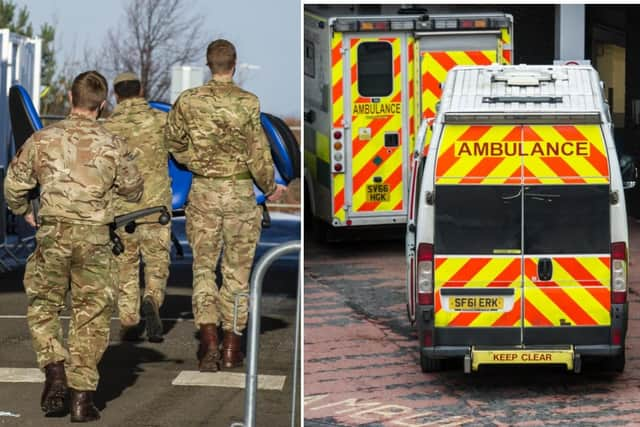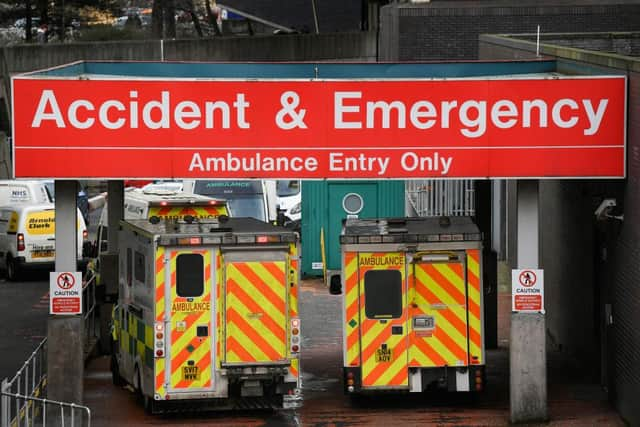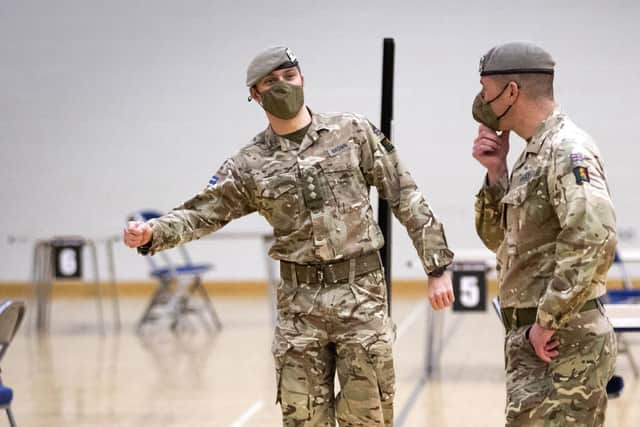Covid Scotland: Army asked to support ambulance service as Sturgeon denies 'crisis' | Nicola Sturgeon says staff under 'acute pressure' and apologises for 'unacceptable' long waits
It comes after several trusts in England called on military support for ambulances in August.
Unions and paramedics in Scotland have warned staff are exhausted and under pressure, working extra hours and through rest breaks.
Advertisement
Hide AdAdvertisement
Hide AdAmbulance crews are routinely forced to wait several hours outside hospitals to discharge patients, they said, preventing them from taking on new jobs.


Gerard Brown, a 65-year-old Glasgow man, reportedly died in his flat after a fall last week, with an ambulance not arriving until 40 hours after the call was made.
Ministers have refused to label the situation a “crisis”, despite calls from opposition MSPs to do so.
Nicola Sturgeon apologised to any patients suffering “unacceptably long waits” for an ambulance.
She told MSPs on Thursday the Scottish Government was considering seeking targeted military assistance to cope with the “intense challenges” faced by the ambulance service.


The Ministry of Defence (MoD) later confirmed a request had been made for support with mobile testing units, to free ambulance staff up for other duties.
“Our ambulance service is working under acute pressure right now, largely due to Covid,” Ms Sturgeon said.
"I want to take the opportunity to thank our paramedics and technicians for the work they are doing in such difficult circumstances.
Advertisement
Hide AdAdvertisement
Hide Ad"While they are responding heroically to these challenges, I recognise that some people are not getting the standard of service that they should be getting, or indeed the standard of service and the Scottish Ambulance Service wants to deliver.


"That is not acceptable and I apologise unreservedly to anyone who has suffered, or who is suffering unacceptably long waits.”
Ms Sturgeon said she plans to meet with the Scottish Ambulance Service to discuss the situation, and that health secretary Humza Yousaf will give an update next week.
An MoD spokesperson said: “The Ministry of Defence has received a request from Scottish Government under the Military Aid to Civilian Authority process. We are working hard to identify where we can most effectively assist other government departments and civil authorities.”
A Scottish Ambulance Service spokesperson said: “It is extremely challenging across the NHS just now and our staff are working incredibly hard to help patients across the country.
"We’re currently at our highest level of escalation and are working in partnership with health boards and the Scottish Government to address the challenges being faced through a range of actions, including the potential for targeted military assistance as in other UK ambulance services.”
It comes as health boards around the country continue to warn of unprecedented pressure on services.
NHS Greater Glasgow and Clyde said services have been “extremely busy” in recent weeks.
Advertisement
Hide AdAdvertisement
Hide Ad"Our emergency department teams have been working incredibly hard to see, diagnose and admit or discharge patients as quickly as possible,” a spokesperson said.
"In recent weeks, however, as has been the case across Scotland, pressures on our services have been mounting due to increased Covid infection, rising ED attendances and additional staffing pressures.
"We recognise the strain this has put on both staff and services and will support both as much as possible.”
Russell Coulthard, deputy director of acute services in NHS Lanarkshire, said: “We continue to experience pressure across our acute hospital sites and in primary care services.
“These pressures are continuing due to three main factors; the number of Covid-19 positive patients, trying to maintain and recover key clinical services, including planned operations, and a shortage of staff due to annual leave or those having to self-isolate as a result of contacts outside of work.”
Willie Duffy, head of health at UNISON, said union officials have been “inundated” by healthcare workers under pressure.
“The service is at breaking point,” he said.
"I’ve never had so many people come to me and say that they’re knackered. It’s coming from a multitude of areas, from short staffing, sickness, self-isolation. We’re getting it quite heavy from a lot of our members.”
Glasgow-based paramedic Liam Boylan said he has seen waits of up to three-and-a-half hours to discharge patients at A&E departments.
Advertisement
Hide AdAdvertisement
Hide AdHe said many calls could be dealt with by other services, and pleaded with people to use “common sense” when deciding whether or not to dial 999.
“It’s not as if we’ve got a huge amount of resources and we’re just not bothering going, we’re trying to get to the people who need us the most,” he said.
“But in between that, we’re sweeping up everything – we’re sweeping up mental health, and people drunk at events like TRNSMT over the weekend.
“We seem to be the cloth that will mop everything up.”
The Scottish Conservatives called on the Scottish Government to declare a “crisis” in the NHS.
"Systemic failures are leaving ambulance crews to turn up and pronounce people dead, instead of having a chance of saving a life,” said party leader Douglas Ross.
“For two weeks in a row, Nicola Sturgeon has been in denial that our NHS is in crisis. Admitting the scale of the problem is essential to tackling it.”
Scottish Labour leader Anas Sarwar said: "It’s clear from Nicola Sturgeon's responses she doesn't understand the scale of the crisis in Scotland’s health service.
"To hear she is considering maybe acting at some point to intervene just isn't good enough.
Advertisement
Hide AdAdvertisement
Hide Ad"This isn’t about the pandemic. There were problems before it. This is an avoidable human tragedy on a heart-breaking scale.
"Pandemic or no pandemic, there’s a simple truth – no-one should be left to die on the floor while waiting 40 hours for an ambulance."
In another individual case, an 86-year-old woman had to wait eight hours for an ambulance after falling and breaking her hip at home.
Lillian Briggs, from Edinburgh, has Parkinson's, skin cancer and has had two heart attacks.
She was left laying on her kitchen floor with a double hip fracture, with her son Robert Ewing telling BBC Scotland: "I thought she was going to die in front of us."
Ms Sturgeon defended her government's record, stating Scotland was facing “probably one of the most challenging combination of circumstances” the Scottish NHS has faced since it was established.
Arguing the ambulance service was already operating at its highest point of “escalation”, she said the pressures on the system were being “largely caused” by Covid-19 pressure.
The First Minister said it was a situation being mirrored across the UK and the ambulance service had received “significant additional funding” to help with recruitment of paramedics and technicians.
Advertisement
Hide AdAdvertisement
Hide AdBut Mr Sarwar responded, saying: “How many more Lillian Briggs need to happen in the next week before we take urgent action, how many more Gerard Browns need to happen in the next week before you take urgent action?
"Urgent action needs to happen today, tomorrow, the day after, the day after, not wait a week for this government to wake up.
“People can’t afford to wait and these problems are years in the making – 600,000 people are on waiting lists for treatments, we have record breaking A&E waiting times, and people are tragically dying waiting for ambulances.
"The First Minister likes to remind us that the buck stops with her. It does, so how many more families will have to suffer?”
A message from the Editor:
Thank you for reading this article. We're more reliant on your support than ever as the shift in consumer habits brought about by coronavirus impacts our advertisers.
If you haven't already, please consider supporting our trusted, fact-checked journalism by taking out a digital subscription.
Comments
Want to join the conversation? Please or to comment on this article.
